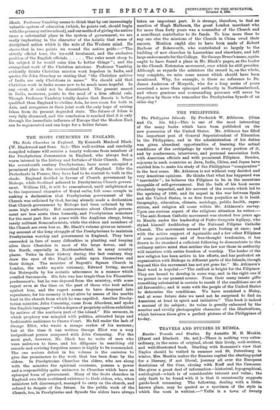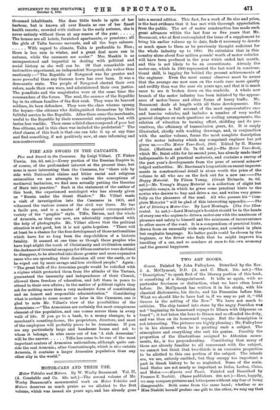TRAVELS AND STUDIES IN RUSSIA.
Russia : Travels and Studies. By Annette M. B. Meakiii. (Hurst and Blackett. 16s. net.)—There is nothing very extra- ordinary, in the sense of original, about this lively, well-written, and well-illustrated book. Starting with Rousseau's view that Naples should be visited in summer and St. Petersburg in winter, Mrs. Meakin makes the Russian capital the starting-point for a literary, if not literal, journey all over the European dominions of the Czar, closing with Kieff and the Caucasus. She gives a great deal of information—historical, topographical, sociological—which is of considerable interest and value ; the only fault to be found with it is that it occasionally suggests guide-book cramming. The following, dealing with a little- known place, may be quoted as a specimen of the style in which the work is written :—" Yalta is a town of twenty thousand inhabitants. She does little trade in spite of her harbour, but is known all eve? Russia as one of her finest health resorts; crowded with visitors in the early autumn, she is never entirely without them at any season of the year The houses are all hotels, furnished apartments, or pensions ; all the girls of Yalta become servants, and all the boys cabmen.
With regard to climate, Yalta is preferable to Nice; there is less rain in winter, and a great deal more Still in autumn, while the summers are cooler." Mrs Meakin is as unimpassioned and impartial in dealing with political and Social history as she well can be. Of that remarkable and instructive experiment, an independent Novgorod, she writes thus cautiously :—" The Republic of Nei/gored was far greater and more powerful than any German town has ever been. It was a democratic state. The people of Novgorod elected their own rulers, made their own wars, and administered their own justice. The posadinks and the magistrates were at the same time the commanders of the forces. The soul, the essence of the Republic lay in its citizen families of the first rank. They were its bravest soldiers, its born defenders. They were the class whence sprang the boyars—the citizens who distinguished themselves by their faithful service to the Republic. After these came the merchants, useful to the Republic by their commercial enterprises, but with tastes less warlike. Then came a third class composed of poor but free citizens, and in this class was included the proletariat." The chief charm of this book is that one can take it up at any time and find something, if not positively new, at once informing and non-controversial.































































 Previous page
Previous page